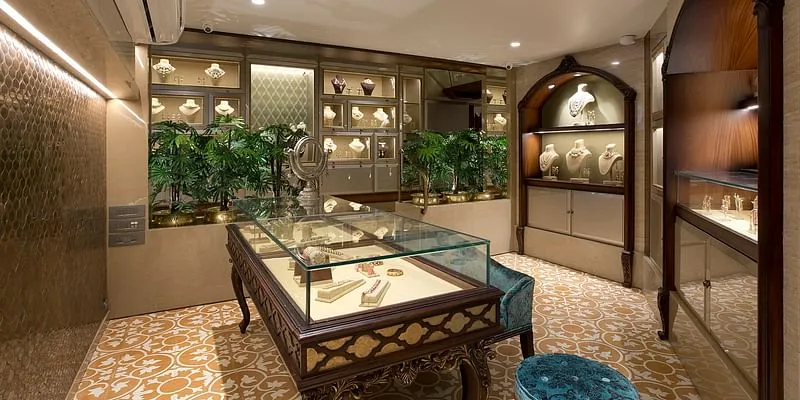Starting a business from her bedroom, how this entrepreneur built a popular Mumbai-based jewellery brand
Launched by Shobha Choksey in 1984, Shobha Shringar is a boutique jewellery brand based in Mumbai that sells hand-crafted pieces of jewellery, gaining prominence through the word of mouth.

Shobha Choksey, Founder, Shobha Shringar Jewellers
In an era where women were largely confined to household work, Shobha Choksey decided to put her free time to use and start a small business. Both her father and her husband were supportive of her decision, and encouraged her to tap into her entrepreneurial flair and creative ambition.
Shobha had an eye for jewellery and wanted to work as a home jeweller. However, in the late 1970s, in Mumbai, the gems and jewellery industry was dominated by family and local jewellers, all of whom were men. It was unheard of for a woman to work as a jeweller, let alone be an entrepreneur.
In 1984, Shobha decided to go against the grain and began working on making pearl jewellery from her bedroom.
“During those days, pearl jewellery was in fashion. People used to manually cut pearls in half for a small fee. My mother started doing this in her extra time. She also began selling pearls and pearl jewellery on a part-time basis,” says Snehal Choksey, Shobha’s son, who later joined her business, in an interview with SMBStory.
It was not easy for Shobha to break into a male-dominated sector. When Snehal joined the business in 1994, it gave his mother the confidence and support to call customers home and sell the jewellery.
“Being a woman entrepreneur, it was challenging for my mother to stand out among other jewellers. However, it quickly began to work in her favour as she understood the needs of clients and customers, convinced them to buy her jewellery, and built their confidence in her,” Snehal says.

Inside the Shobha Shringar store in Mumbai
Building a brand
Relying on word of mouth to find customers, the mother-son duo had visible success. The pearl jewellery was selling well. Shobha and Snehal then decided to christen their business Shobha Shringar Jewellers.
They would approach vendors and source from them a few articles of jewellery at no cost. They would then call customers to their home, sell the jewellery to customers, pay back the vendor, and retain their margin. If some items of jewellery wouldn’t sell, they’d simply return it to the vendor.
“Once the business picked up, we took a bigger house and started using the living room to showcase the jewellery. During the day, we’d convert the living room into a showroom to display the pieces. In the evening, we’d pack everything up and convert it back into a living room,” Snehal says.
Eventually, they borrowed some money and moved into a 400 sq ft store in South Mumbai. By then, they had built up the capacity to invest in buying jewellery, i.e., they would pay vendors the full amount for some items of jewellery, and sell them under the Shobha Shringar brand.
“We sourced products from the jewellery market and sold them to customers who came into the store. This was a one-stop-shop which satiated every jewellery need. The intention was to cater to the unique requirements of clients and make available a plethora of products such as nose pins, bridal trousseaus, toe rings, mathapattis, pearls, colour stones, uncut as well as certified fine cut diamonds, jadau karigari, temple jewellery, etc,” he says.
Vendors from across the country approached the mother-son duo to get their jewellery sold through Shobha Shringar. The brand also added bridal jewellery to its portfolio.

A gold necklace crafted by Shobha Shringar Jewellers
Operating model
As Shobha Shringar’s popularity rose over the years, the business acquired more space in the same building as its first store. A few years ago, it took over the entire building, and now has a four-storey showroom to display its range of products.
Today, it only sells jewellery that it designs or manufactures, i.e., it does not take pieces on approval basis for reselling or sell a third party’s items.
“We do manufacturing across the country in interior regions. For instance, we have some manufacturing happening in Coimbatore and Chennai. Some facilities are owned by us, while others are hired. We have a team of 35 people in our main showroom, around 60 to 70 in our manufacturing workforce, and around five who are constantly on the road for sales,” he says.
Snehal doesn’t disclose sales or the revenue, but claims the company has been steadily growing at a rate of 15 to 20 percent year-on-year in terms of its bottom line and topline.
The jewellery brand’s rise to fame in Mumbai can be attributed to its dependence on word-of-mouth marketing and singular, flagship showroom, besides its products. Snehal refers to the showroom as a boutique store, and says the experience is different from walking into a regular jewellery store.
“Here, we try to bring about a homely or pampering vibe, where customers would like to sit for hours and see all the products. We have a team which guides customers and assists them with tailor-made and exclusive jewellery, all of which is hand-made,” he says.
The brand has also indulged in digital marketing across social media platforms as well as tied up with Bollywood celebrities to promote its jewellery for increased brand awareness.
COVID-19 and future plans
In the wake of the COVID-19 pandemic and the subsequent lockdown, Shobha Shringar has considered new strategies for customer outreach.
“While I still believe in word-of-mouth marketing, we are trying to go along with the times. The COVID-19 situation has given us time to introspect because we usually don’t get time to think of new strategies. During this time, we have built an ecommerce platform to showcase and sell our jewellery which falls below the Rs 2 lakh price range. We are considering integrating the platform with our existing website, and it is expected to launch soon,” he says.
With potential and existing customers sceptical of visiting stores for shopping due to the pandemic, Shobha Shringar is also building a showroom-at-home experience.
“We use Skype or WhatsApp video calls to display products to people, who shortlist a few items. We then send the shortlisted products to their homes through our teams. Once customers finalise on a product, we make the sale,” he says, adding:
“With the price of gold escalating during lockdown, gold is showing it is the only asset class which continues to have high liquidity and give a return on investment. If jewellery businesses have their financials in order and survive the current rough patch, they are in for some good times.”
Edited by Kanishk Singh








